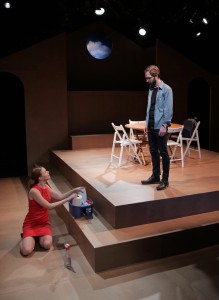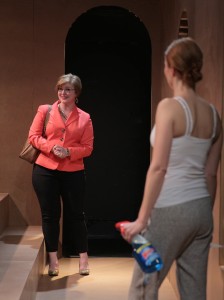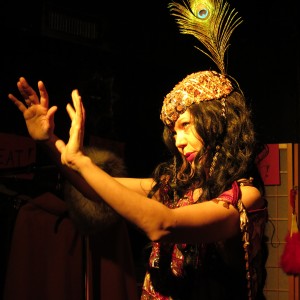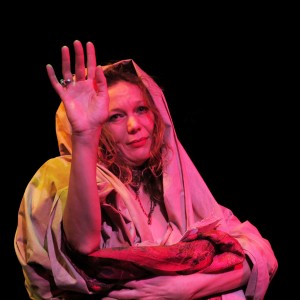Dutch Kills Theater's In Quietness, written by Anna Moench and directed by Danya Taymor, examines the intersection between present-day feminism and traditional ideas about gender roles. Small in some ways and large in others, it tackles the issue, and its aftermath of what happens when a marriage isn't fulfilling and results in one spouse having an affair. In this case, the story revolves around Max, played with efficiency and grace by Kate MacCluggage, and Paul, played with an effective lethargy by Blake DeLong. They seem like the classic mismatched couple: him in his hipster jeans, bits of facial scruff and glasses, and her in her jeggings, or black tailored pants and power suit jackets. Max has a corporate job, which requires her to travel often. She comes and goes, and on one stopping, Paul drops a bomb on her while she’s ordering Thai food. “I’m having an affair,” he confesses. She pauses, but then continues with the order on the phone. After this bomb is dropped, playwright Moench uses repetition effectively. Max wheels in her suitcase several times, but only to the door and turns around, until finally, they are catapulted to Texas, and the Southern Baptist school where Paul is to study to become a minister. He has found God in a Bible studies class during Max’s business trips which was also the place where he found the woman he had an affair with. Max follows him there, but must live in the Homemaking House, a place overseen by Terri, the housemother of the Southern Baptist School. Alley Scott is sparkling as Terri, and does a superb job of playing up the cheerful, yet judgmental nature of Southern hospitality. As a character, Terri is precise, demanding and in charge. Every surface needs to be polished, scrubbed and shined; all with a smile.
Max is a fish out of water here. Once upon a time, she was in charge. She tells Beth, her roommate, that wearing high heels, which clack loudly as you walk, are necessary to let underlings know you’re coming. She has no idea how to wield a bottle of Windex or set a table. She’s been living in a world where women have as much power as men. Yet, she is compassionate, like an older sister, towards Beth when Beth confesses she doesn’t want to get pregnant before she’s married.
Beth, played by the lovely Lucy DeVito, has a complex problem: fiercely devoted to God, she is a gifted orator and potential luminary. Max, who sees the world through a different lens, tells her she should become a minister. Beth rejects the idea vehemently and proclaims that that’s a man’s job, and women are meant to serve. She is also in deep denial about the reality of her marriage prospects and is overcome at one point in which she declares that men need to “man up!” and wonders what’s wrong with them, with their “facial hair and jewelry,” and their lack of commitment to marriage when all they want to do is “take their girlfriends backpacking in Thailand” instead of settling down, getting a job and caring for a wife. Beth, the most willingly submissive to traditional ideas wants men to be strong and certain in their roles, yet she is clearly the stronger sex.
Max and Paul seem at odds throughout the play, and the dark and moody lighting by Masha Tsimring and Caitlin Smith Rapoport juxtaposed with startling brightness, plays up the tension. The fact that Max follows Paul to Texas to a Southern Baptist School where she learns homemaking is a little unbelievable. Their love seems wan, and barely worth it. Feminists would be furious with the message too: it is Max who changes and learns to cook and clean, and look after her husband. When he says, “I like this new you,” it’s almost insulting. What about a new him? He’s mopey, and spineless; confused by his calling to God and his role in the relationship. He did something wrong by having an affair, yet he punishes Max and pushes her away. It’s unclear why Max takes it. In fact, it is the new Max, the ex-corporate saleswoman, who seems even more empowered by her additional skills of learning to cook and take care of the house. In a way, she has become more self-sufficient and it seems highly plausible she could set out on her own now, and take better care of herself. Maybe even find a better man.
In Quietness examines traditional ideas about gender roles, but also highlights the confusions that have come about as ideas have changed. Today, women are more equal to men in the work world, and men are stepping up to the plate with childcare and housework. That said, it would be nice if Paul could “man up,” as Beth proclaims, instead of wallowing in his confusions about his role as a partner to Max. She deserves it.
Presented by Dutch Kills Theater, In Quietness by Anna Moench, is playing at Walkerspace (46 Walker St. between Church St. and Broadway) in Manhattan through Jan. 30. Performances are at 8 p.m on Wednesday-Saturday. Tickets are $18 and can be purchased by visiting www.dutchkillstheater.com.










